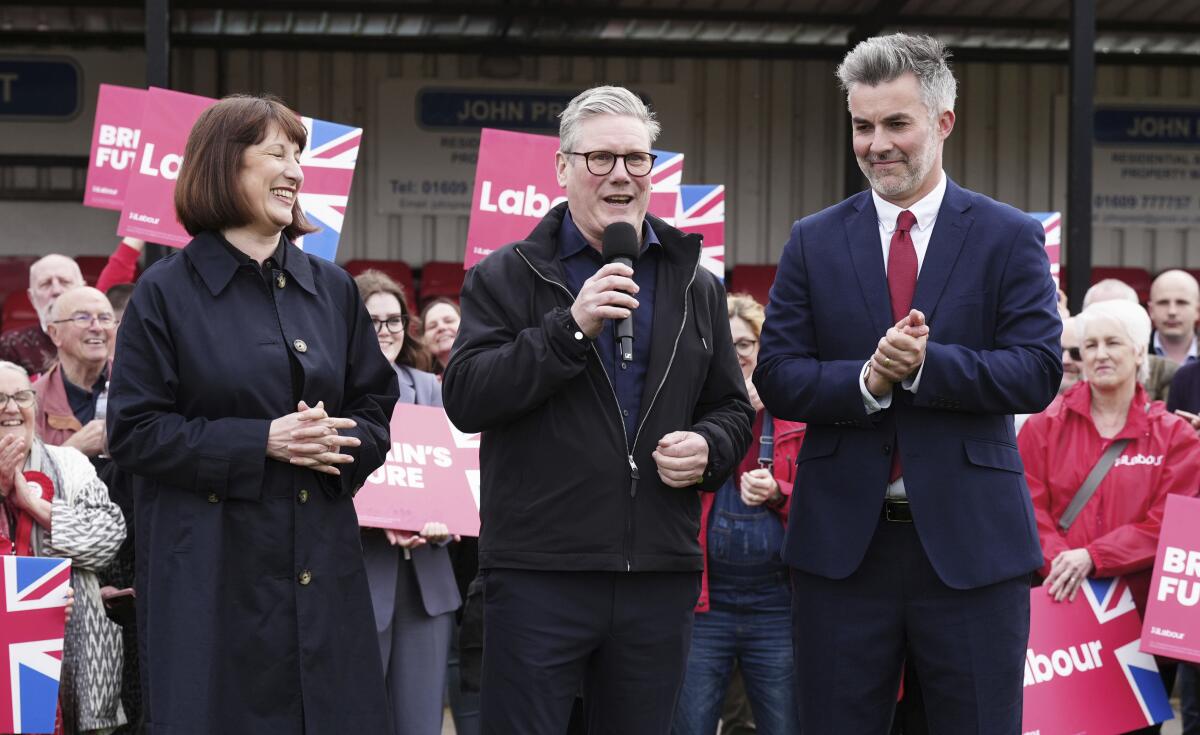Britain’s Conservatives suffer historic losses in elections as Labor edges closer to power

- Share via
LONDON — Britain’s governing Conservative Party suffered heavy losses in local election results Friday, further cementing expectations that the Labor Party will return to power after 14 years in a U.K. general election that will take place in the coming months.
Labor won control of English councils that it hasn’t held for decades and was successful in a special election for a seat in Parliament. If those results are repeated in the general election, it would lead to one of the Conservatives’ biggest-ever defeats.
In some areas with large Muslim populations, such as Blackburn and Oldham in northwest England, however, Labor candidates appear to have suffered as a result of the leadership’s strongly pro-Israel stance in the war in Gaza.
Perhaps most important in the context of the general election, which has to take place by January but could come next month, Labor won back the parliamentary seat of Blackpool South in the northwest of England. The seat had gone Conservative in the last general election in 2019, when then-Prime Minister Boris Johnson made big inroads in Brexit-supporting parts of the country.
Israel-Hamas war: In Qatar’s capital, a compound housing Palestinian medical evacuees from Gaza is a living catalog of what war does to the human body.
Labor leader Keir Starmer went to Blackpool, a coastal resort town, to congratulate Labor’s Chris Webb and urged British Prime Minister Rishi Sunak to call a general election. Sunak has the power to decide on the date, and has indicated that it will be in the second half of 2024. “This was directly to Rishi Sunak to say we are fed up with your decline, your chaos and your division and we want change,” Starmer said.
John Curtice, professor of politics at the University of Strathclyde, said Conservatives were losing about half the seats they are defending.
“We are probably looking at certainly one of the worst, if not the worst, Conservative performances in local government elections for the last 40 years,” he told BBC radio.
Conservative Sunak became prime minister in October 2022 after the short tenure of Liz Truss, who left office after 49 days after the presentation of a budget of unfunded tax cuts that roiled financial markets and sent borrowing costs for homeowners surging.
Kharkiv, Ukraine’s second-largest city, is facing intense Russian airstrikes, but its residents are defiant. “We can stand up, no matter what they do,” one said.
Her chaotic leadership compounded the Conservatives’ difficulties after the turmoil surrounding her predecessor, Johnson, who was forced to quit after being found to have lied to Parliament over COVID-19 lockdown breaches at his offices on Downing Street.
Nothing Sunak has tried to do has shifted the political needle, with Labor consistently 20 percentage points ahead in opinion polls.
Pylas writes for the Associated Press.
More to Read
Sign up for Essential California
The most important California stories and recommendations in your inbox every morning.
You may occasionally receive promotional content from the Los Angeles Times.












